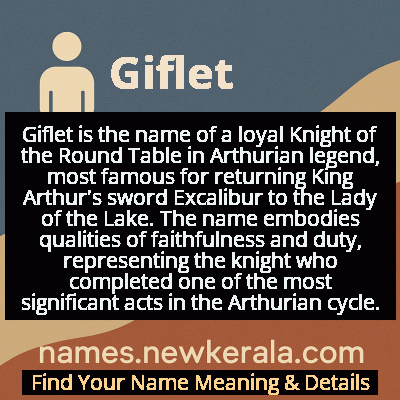Giflet Name Meaning & Details
Origin, Popularity, Numerology Analysis & Name Meaning of Giflet
Discover the origin, meaning, and cultural significance of the name GIFLET. Delve into its historical roots and explore the lasting impact it has had on communities and traditions.
Name
Giflet
Gender
Male
Origin
Arthurian
Lucky Number
5
Meaning of the Name - Giflet
Giflet is the name of a loyal Knight of the Round Table in Arthurian legend, most famous for returning King Arthur's sword Excalibur to the Lady of the Lake. The name embodies qualities of faithfulness and duty, representing the knight who completed one of the most significant acts in the Arthurian cycle.
Giflet - Complete Numerology Analysis
Your Numerology Number
Based on Pythagorean Numerology System
Ruling Planet
Mercury
Positive Nature
Adventurous, dynamic, curious, and social.
Negative Traits
Restless, impatient, inconsistent, prone to indulgence.
Lucky Colours
Green, white.
Lucky Days
Wednesday.
Lucky Stones
Emerald.
Harmony Numbers
1, 3, 9.
Best Suited Professions
Sales, marketing, travel, entertainment.
What People Like About You
Versatility, charisma, adventurous spirit.
Famous People Named Giflet
Sir Giflet
Knight of the Round Table
Returned Excalibur to the Lady of the Lake after King Arthur's final battle
Giflet le Fils de Do
Arthurian Knight
Featured prominently in the Post-Vulgate Cycle and Thomas Malory's Le Morte d'Arthur
Giflet the Loyal
Legendary Knight
One of the few knights who remained loyal to Arthur until the very end
Name Variations & International Equivalents
Click on blue names to explore their detailed meanings. Gray names with will be available soon.
Cultural & Historical Significance
In various Arthurian texts, particularly the Post-Vulgate Cycle and Thomas Malory's Le Morte d'Arthur, Giflet appears as a consistent member of the Round Table, often depicted as a reliable and trustworthy knight who may not seek the glory of others like Lancelot or Gawain, but whose steadfastness makes him essential to Arthur's court. His character embodies the ideal of service and duty over personal ambition, making him a crucial supporting figure in the Arthurian tapestry. The cultural significance of Giflet lies in his representation of the often-overlooked but essential virtues of reliability and faithful service that form the foundation of any successful community or kingdom.
Extended Personality Analysis
Giflet is characterized by exceptional loyalty, reliability, and a strong sense of duty above all else. As the knight chosen for the sacred task of returning Excalibur, he demonstrates unwavering faithfulness to Arthur even when other knights have fallen away or betrayed their king. His personality reflects the medieval ideal of the dependable vassal who serves without seeking personal glory or reward. This makes him less flamboyant than other Arthurian knights but arguably more essential to the functioning of the Round Table.
Giflet possesses the courage to carry out difficult tasks without hesitation, as evidenced by his willingness to throw the sacred sword back to the Lady of the Lake despite his initial reluctance. He combines practical wisdom with emotional depth, understanding the symbolic importance of his actions while feeling the weight of his responsibilities. His character suggests a knight who thinks before he acts, who considers consequences, and who places the greater good above personal desire—qualities that make him particularly suited for the solemn duty that defines his legacy in Arthurian lore. These traits position him as the embodiment of quiet strength and principled action in the Arthurian world.
Modern Usage & Popularity
The name Giflet remains extremely rare in modern times, primarily used by Arthurian enthusiasts, historical fiction authors, or parents seeking unique names with literary and chivalric connections. It has never appeared in popular baby name rankings and maintains its status as a specialist name within Arthurian circles. Contemporary usage is almost exclusively limited to fictional characters in Arthurian retellings, fantasy literature, and role-playing games where medieval themes are prominent. The name's obscurity means that those who choose it typically have specific knowledge of Arthurian legend and wish to honor the character's qualities of loyalty and duty. In recent years, with renewed interest in medieval literature and fantasy genres, the name has seen minor resurgence in niche communities, though it remains far from mainstream acceptance due to its archaic sound and strong association with a specific literary character.
Symbolic & Spiritual Meanings
Giflet symbolizes ultimate loyalty, the acceptance of difficult duties, and the bridge between the magical and mortal worlds. His defining act—returning Excalibur to the lake—represents the completion of cycles, the respectful handling of power, and the willingness to carry out necessary endings. The character embodies the concept of faithful service even when it requires personal sacrifice or going against one's immediate desires. Symbolically, Giflet stands as the guardian of transitions, the one who facilitates the passing of eras and the return of magical artifacts to their proper realms. His role connects him to themes of closure, responsibility, and the understanding that some tasks, while painful, must be performed for the greater good. The throwing of the sword back into the water symbolizes the release of power, the end of an age, and the trust required to complete sacred obligations that transcend individual desires.

